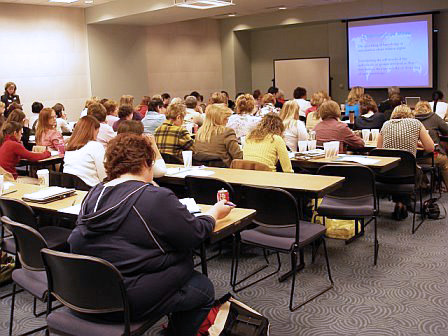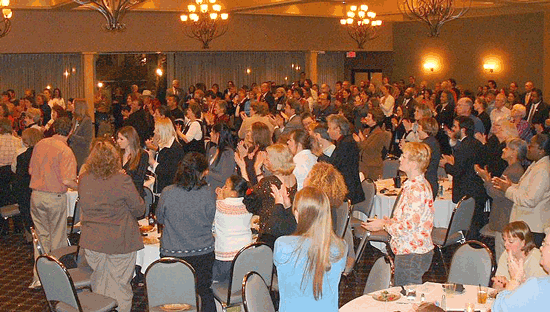Summer 2010 Newsletter
After 13 years as the executive director of the Kansas Coalition Against Sexual and Domestic Violence, Sandy Barnett accepted a position as the vice president of the Florida Coalition Against Domestic Violence. A reception was held in her honor on July 9.
Sandy leaves KCSDV as a strong organization; its leadership at the board and staff level, continuity of funding and statewide partnerships is unparalleled and will lead the organization into the next decade. KCSDV will embrace this change and move to new heights of success with advocacy and social change precisely because of the strength that each board and staff member, direct service program, project partner and supporter brings to this work. With your continued support, this change of leadership will be seamless and we will work together to meet new challenges and reach new successes.
We also announce that Joyce Grover, Esq. has been appointed as the interim executive director. Joyce has worked at KCSDV for more than eight years and she will continue to provide stellar leadership during this time of transition.
If you have any questions, please don’t hesitate to contact Joyce at 785-232-9784, or Sarah Terwelp, KCSDV board president, at 785-331-2034.
Most Sincerely,
Sarah Terwelp, KCSDV board president
The Kansas Coalition Against Sexual and Domestic Violence provides training and support for advocates and allies who are providing direct services to victims and survivors throughout the state of Kansas. Preliminary numbers indicate that KCSDV provided the following support to advocates and allies from July 2009 to June 2010:
- Answered 2,073 requests for technical assistance from advocates and allies
- Trained 2,166 advocates and allies
- Hosted 129 training events

KCSDV hosts more than 100 training events annually.
KCSDV staff attended 1,558 hours of training to enhance best practices and learn more about emerging issues in relation to sexual and domestic violence, dating violence and stalking. KCSDV initiatives include, but are not limited to, providing training, technical assistance, capacity building, accreditation standards and legislative advocacy.
Safe Homes, Safe Streets (SHSS) is the Kansas Coalition Against Sexual and Domestic Violence?s annual event that bridges public awareness and policy work. For the past seven years, SHSS has been providing information to legislators and the general public about the prevalence of sexual and domestic violence, and the benefits of creating a state in which everyone is safe at home and on the streets.

Safe Homes, Safe Streets reception attendees
SHSS features two days full of activities, including a press conference, advocate training, a public policy briefing, a private reception for KCSDV member program staff and a public reception for legislators, advocates and ally organizations. SHSS 2011 will be February 8-9 at the Ramada Convention Center in Topeka.
For more information:
Melissa DeDonder, communications coordinator, mdedonder@kcsdv.org, 785-232-9784
 On September 1, the Kansas Commission on Judicial Performance will be posting judicial performance evaluations for all judges who will stand for retention election on November 2. The commission encourages everyone to review the website www.kansasjudicialperformance.org prior to voting in November.
On September 1, the Kansas Commission on Judicial Performance will be posting judicial performance evaluations for all judges who will stand for retention election on November 2. The commission encourages everyone to review the website www.kansasjudicialperformance.org prior to voting in November.
For more information: Kansas Commission on Judicial Performance, kcjp@kcjp.ks.gov, 785-296-8949
Immigrant survivors face numerous barriers in accessing services for themselves and their children. These barriers are often magnified if the survivor does not possess permanent legal status in the United States. Batterers use a variety of tactics to isolate and intimidate an immigrant survivor, including threatening to have her deported if she attempts to reach out for help. These tactics are often reinforced by the anti-immigrant sentiment that is present in the media and throughout our society. In recent months, the increase in this anti-immigrant public discourse has made an immigrant survivor?s path to safety even more daunting.
In an effort to ensure that all individuals retain the right to access services, the U.S. Department of Health and Human Services (HHS) recently redistributed information clarifying which services must be open to all individuals. These documents include HHS?s Domestic Violence Fact Sheet, which addresses the protections that are in place for immigrant survivors. A summary of HHS? clarification follows below:
Are battered immigrants eligible for battered women’s shelter services funded by HHS?
Yes. Battered women’s shelters receive funding from a variety of Federal sources, including Family Violence Prevention and Services Act (FVPSA) funding from the Office for Community Services in the Administration for Children and Families. These funds are administered through a designated state agency. There are no immigration restrictions included in FVPSA, and HHS has not designated FVPSA monies as a federal public benefit program that requires verification of immigration status. Other important points to remember about FVPSA funding include:
- FVPSA-funded programs may not discriminate based on national origin. 42 U.S.C. 10406.
- Formula grant-funded activities must address ethnic, cultural and language-diversity issues. 42 U.S.C. 10402(a)(2)(C).
- States must document procedures that they have developed and implemented to assure the confidentiality of records pertaining to any individual provided FVPSA-funded services. 42 U.S.C. 10402(a)(2)(E). Most, if not all, states have statutes or policies protecting the confidentiality of information provided by a victim of domestic violence to a domestic violence counselor or advocate.
Complete information and additional materials can be found on their website: hhs.gov.
In addition, nonprofit charitable organizations, including sexual and domestic violence organizations, have no obligation to inquire about the immigration status of persons who seek their services unless doing so will either determine whether the person may qualify for an immigration remedy, or will determine if additional referrals are needed. KCSDV recommends that if a conversation about status is required, the conversation should be handled carefully. Begin the conversation by asking ?do you have any immigration concerns,? rather than asking ?what is your status?
The republication of the HHS Domestic Violence Fact Sheet does not change existing law, but it does clarify that services protecting life or safety must be inclusive to everyone a reminder about the importance of providing safe, confidential services to all survivors and their children.
For more information:
Pam Jacobs, immigration projects attorney, pjacobs@kcsdv.org, 785-232-9784.
Native American women are victims of violent crime, including sexual and domestic violence, at a rate three and a half times greater than the national average. In July, President Obama signed the Tribal Law and Order Act, which will work to help the Federal Government address the unique public health and safety challenges that confront tribal communities.
The Tribal Law and Order Act will work to strengthen tribal law enforcement and the ability to prosecute and fight crime. Because one in three Native American women will be raped in her lifetime, the Indian Health Care Improvement Act will require health care facilities to implement standardized practices to improve services provided to victims of sexual assault. As a result, more women will be able to get the care they need for healing, and consistent standards will aid in the prosecution of perpetrators of violent crimes against women.
The Act focuses not only on prosecution, but also on crime prevention. It reauthorizes and improves programs to prevent and treat alcohol and substance abuse. Because men and boys play a critical role in global efforts to end violence against women and girls, the Act also reauthorizes programs that improve opportunities for at-risk Indian youth.
Watch the video of the signing, below, which includes a moving introduction from Lisa Marie Iyotte, survivor.
You can read more about the Tribal Law and Order Act from Lynn Rosenthal, White House Advisor on Violence Against Women, and a transcript of President Obama’s remarks at whitehouse.gov
Child maltreatment is closely linked to adult domestic and sexual violence ? more than 30 studies illustrate a co-occurrence rate of between 30 and 70 percent. Despite these statistics, nationwide intervention strategies historically came from two distinct systems working independently of each other. This approach created many challenges, including the following:
- Children were sometimes removed from homes where a protective parent, also a victim of abuse, had been providing safety and care for the children.
- Protective mothers were afraid to seek support for their children and themselves because they feared losing custody of their children either to the state or to the perpetrator.
Sexual and domestic violence advocates nationwide recognize a need to collaborate with the child welfare system to enhance support and services for survivors and their children. In 2002, the Kansas Coalition Against Sexual & Domestic Violence began collaborating with the Kansas Department of Social and Rehabilitation Services, division of Children and Family Services on the KCSDV Child Welfare Project.
As a result of this collaborative project, more than 500 child welfare professionals and sexual and domestic violence advocates statewide have received training on best practices related to the intersection of sexual and domestic violence and child welfare. New tools and resources have been developed, including a desk reference guide for child welfare professionals and a resource guide for children?s programming advocates working in sexual and domestic violence advocacy organizations.
The KCSDV Child Welfare Project has enhanced collaborative relationships at both the community and state level. Relationships have been strengthened between child maltreatment investigators, case managers and service providers, and sexual and domestic violence advocates. Sexual and domestic violence advocates and child welfare professionals provide guidance and evaluation for the work on this project.
Great strides have been made through this project, but there is more collaborative work to be done. Survivors experience many barriers as they try to access safety and support from many systems working independently of each other. One of the greatest barriers for survivors is shared across all systems ? perpetrators frequently use children as a means to abuse the protective parent. Perpetrators often threaten to ?take? the children, and when these threats are used in conjunction with custody and parenting time litigation, they continue to jeopardize the safety of survivors and their children. Until all systems are working to protect survivors and their children, the work of the KCSDV Child Welfare Project must continue.
For more information:
Kathy Wood, child welfare projects team leader, kwood@kcsdv.org, 785-232-9784.
KCSDV hosts more than 100 training events each year for advocates and allies, including social workers, health care and mental health professionals, attorneys, educators and more. Visit the KCSDV training calendar to find an event to suit your needs. Bookmark this link and check back often because new events are added throughout the year.
Host a workshop or community presentation. Contact your local sexual or domestic violence advocacy program to learn how you can host a workshop for your organization or employees. See the map below for contact information.
Get involved. To learn more about local events and volunteer opportunities, contact the sexual or domestic violence advocacy program near you. See the map below for details.
KANSAS CRISIS HOTLINE: 888-END-ABUSE | 888-363-2287